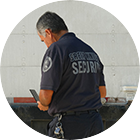De-escalation is cooling down a tense situation before it spans beyond control. It involves reducing the intensity of a confrontation and preventing it from resulting in a more destructive situation. De-escalation skills are vital in security environments, personal relationships, customer service interactions, and other working spaces. These skills help to maintain productivity and harmony in places where misunderstandings can easily cause violence.
Verbal De-Escalation Method For A Security Guard
Confrontations are inevitable and can arise in any place and form. They can occur when two opposing principles or parties try to show their might. These incidents are prevalent in the security environment. Sadly, most industry principals lack a proper attitude toward confrontations. This means they do not have the essential skills and understanding of de-escalation of confrontations.
Confrontations often arise when two individuals disagree. The disagreement can result in frustrations that rapidly escalate to anger. If not resolved, this can degenerate into violent aggression and other forms of misbehavior. However, this is not a preordained outcome. As a confrontation unfolds, its outcome will vary based on each party's role. It is, therefore, necessary that you understand the principles of nonviolent conflict resolution. You should remember that you control how you act when handling confrontations in a security setup. Maintaining a positive attitude and concentrating fully on the confrontation is good. Your attitude will be evident every time you communicate verbally or nonverbally. You should present an unbiased, professional, calm, and positive attitude. This aims to mold the parties' behavior and promote voluntary compliance using verbal techniques.
The primary trigger of confrontations in a security environment is aggression arising from frustration. This happens when an individual demands something he/she cannot have, like entry into a building or an extra drink. Alcohol or drugs, lack of adequate communication skills, and communication breakdown can cause a confrontation. The main goal should remain constant regardless of the contributing factors. You should de-escalate the conflict as you concentrate on a compliant outcome.
You should consider several factors when identifying, managing, and de-escalating confrontations. The techniques you employ when dealing with a confrontation must be processed and implemented quickly. Col. John Boyd's "The OODA Loop" is one of the most straightforward and best techniques. This technique was developed during the war in Korea.
OODA loop means "Observe, Orientation, Decision, and Action. In this case, you first must observe all aspects of the confrontation or situation awareness. It is essential to consider the whole incident and its contributing factors. Secondly, you should orientate the information that you have processed regarding the confrontation and compare it to the following:
- Security training
- Your knowledge, and
- Your experiences
Thirdly, the appropriate course of action must be chosen and implemented. Regardless of your action, there will be a change in circumstances or a resultant reaction. OODA loops can happen in a short span. Security guards, particularly in entertainment joints, deal with individuals influenced by alcohol or drugs. You must make quick decisions in volatile and high-stress situations in these places. These factors cause confrontations, and you need to consider them while maintaining a logical, professional, and calm front. However, similar responses can be applied in situations requiring loss prevention. You can find yourself interviewing individuals who have arrest records for shoplifting crimes. These criminals can react aggressively because of fear of arrest and potential conviction.
Effective verbal de-escalation methods are a true art. You require tact and patience to be able to de-escalate confrontations verbally. A guard must also be able to control their ego and pride to de-escalate conflicts.
The crucial aspect of dealing with security-related confrontations is understanding that they are not personal. In most security-related confrontations, people usually vent at the authority a guard represents but not at the guard. The authority that the guard represents prevents an individual from entering an entertainment joint or having one last drink. It is easier to suppress a confrontation with focus, impartiality, and empathy once you understand it is not personal. You will be mindful that you are in charge of how you react if you remove the personal element from a confrontation.
Other Essential Skills For Effective De-Escalation Of Confrontations
Knowing how to suppress a confrontation is vital when you are in a tense situation. Diffusing an immediate conflict is essential, but you also need to prevent it from escalating in the future. Appropriate skills can enhance a peaceful environment, develop trust, and protect relationships. Other crucial de-escalation methods a security guard can use to suppress confrontations include:
Cultural Sensitivity
Cultural differences usually significantly impact how individuals perceive and respond to confrontations. It is important to embrace the differences for effective de-escalation. What is regarded as a neutral phrase or action in one culture can be aggressive or lack of respect in another culture. You can only navigate these differences with understanding and respect if you become culturally sensitive. For example, keeping eye contact in some cultures can be a sign of respect; in others, it can be deemed confrontational. The aspect of personal space also differs widely. You can adapt your technique to fit the conflict better if you understand these nuances.
A guard should remain open and observant when dealing with people from various cultural backgrounds. You should ensure that your words and actions are appropriate. Cultural sensitivity can enhance respect and more inclusive security environments. It can also prevent misunderstanding.
Customized Training Programs
Most industries have their challenges regarding confrontations and de-escalation. A one-size-fits-all technique cannot address the specific needs of diverse working environments. There are customized de-escalation training programs for each sector's unique requirements. For example, police officers are trained to defuse risky situations while maintaining public safety, embracing verbal de-escalation methods, and minimizing the use of force. Security guards are trained in de-escalation methods to prevent possible violent cases. This guarantees every person security without resorting to aggressive measures.
Setting Boundaries
The primary purpose of de-escalation is to reduce conflict but not allow an individual's behavior to continue unchecked. A guard must set clear boundaries if people's actions in a security environment are inappropriate or harmful. The guard must do this to maintain respect for themselves and the situation while also guiding the conversation toward a solution. Calmness asserts the boundaries of a guard if another person is being hostile or disrespectful. Setting boundaries prevents a confrontation from getting out of hand. You will show the other person that you are willing to settle the issue, but there are limits to acceptable behavior. You will also be sending a message to the person that he/she must remain respectful for a productive solution.
Avoiding Judgment
People are always sensitive to feeling judged when emotions are high. Ensuring a person feels understood without judgment is an integral part of de-escalation. In this case, a guard should actively listen and acknowledge the other person's feelings. The guard should also answer the person in a manner that shows empathy. For example, a person can be upset because of being stopped at the gate to be checked. The guard should not defend their action right away. He/she should humbly acknowledge the person's frustration and explain why he/she should do that. This approach will make the person feel understood and heard, which will prevent the possibility of further confrontation. Avoiding judgment helps guards to create a connection with people. It also promotes a sense of trust, which is crucial for de-escalating conflicts.
Patience
At the time of a confrontation, patience can be an invaluable tool. Emotions always run high, and giving someone ample time to process their thoughts and feelings is essential. A conflict can escalate if you rush to resolve it or make a decision that risks pushing another person into more frustration.
Most of the time, security guards deal with angry people in security environments. You should allow these people to calm down instead of bullying them. It is vital to understand people's frustrations and help them overcome them. Understanding an angry person shows respect for their emotional state and helps to defuse the situation. Patience involves giving emotional people time to calm down and think clearly, which leads to better outcomes.
Problem-Solving Approach
It is usually a game-changer during a confrontation if you shift focus from the problem to a solution. A guard can easily fall into a cycle of blaming when tensions rise. Guiding the conversation toward solutions can be a good de-escalation strategy. The main aim is to help others feel you are working together to solve the problem instead of arguing over who is at fault.
For example, a customer can become upset in a supermarket because their order has not arrived. A security guard should focus on how to fix the problem instead of blaming the customer for an inappropriate address or pointing fingers at the delivery team. Assuring the customer that all is well can calm the situation immediately.
Awareness Of Personal Space
Personal space is ordinarily essential when trying to de-escalate a confrontation. Sometimes, some people feel threatened when emotions run high and if their space is violated. Keeping an appropriate distance is a sign of respect for their boundaries, and it can assist in defusing tension. For example, it is a good gesture for a guard to step back a little when another person is visibly angry. This will give the person enough space to breathe and collect themselves. The simple strategy is to help the person know you are not trying to crowd or overpower their space. This is an appropriate gesture that can reduce hostility.
It is vital to maintain and respect personal space in any conflict situation. This will help the other person feel respected, safe, and ready to participate in a healthy conversation.
Simple And Clear Communication
Communication can be affected when emotions run high. Simple and clear communication can help de-escalate a confrontation. Using straightforward and short sentences is key because a person usually struggles to absorb complicated messages when upset. You should be concise and avoid giving complex explanations. It is also essential to guarantee a person that you will help solve the problem. You should initiate a manageable conversation that the person understands and feels less overwhelmed. Clear and effective communication will de-escalate a confrontation.
Non-Threatening Body Language
A guard's body language plays a significant role in communication, mainly when emotions run high. Non-verbal clues like aggressive posture, clenched fists, or crossed arms can escalate a confrontation, even if the words are kind. Showing non-threatening body language shows that you are ready to solve the problem. You can show neutral body language by keeping an open stance with your body relaxed and visible hands. Maintaining eye contact at eye level is also a sign that you are approachable and attentive. For example, a person will feel defensive if he/she is upset and you make threatening gestures. However, you will cool down the situation if you keep a neutral position with a relaxed posture.
Empathetic Listening Skills
Some individuals will always feel frustrated if they feel unheard. Empathetic listening goes beyond hearing the spoken words. A guard should understand the perspective of the other person. He/she can de-escalate the confrontation by actively listening to different people. This gesture signifies that you respect their feelings and are interested in solving the problem.
A guard should acknowledge a person's concerns when he/she is upset. Assuring the person you will work together to find the solution is essential. You will de-escalate the tense situation by validating a person's emotions. You must also create an environment where people feel comfortable while expressing themselves. Providing thoughtful responses and listening can diffuse escalating confrontations faster.
Emotional Intelligence
Emotional intelligence is the capacity to control and manage your emotions while understanding other people's emotions. You should keep calm during stressful situations. A guard should take a deep breath and regulate their emotions before responding when tension builds. Being calm allows a guard to act rationally and avoid impulsive reactions.
It is suitable for a guard to stay calm when someone comes to any entrance and he/she is angry. Calmness will de-escalate the anger. A confrontation will arise if you become defensive or raise your voice. Use positive body language and soothing tones and show genuine interest in resolving the person's concerns. Staying in control is a good gesture because the other person will feel you are ready to help them obtain a solution.
Importance Of Guard De-Escalating Training In Mitigating Confrontations
Confrontations and violence can arise in any setting because of our increasingly interconnected and diverse world. De-escalation training is important to mitigate these issues. It will also ensure organizational harmony and individual safety. You can only prevent the confrontation or conflict before it starts by employing effective conflict resolution. However, some of the benefits of this training include:
Promotes Conflict Resolution Skills
De-escalation skills are essential for appropriate conflict resolution. They assist the guards in navigating confrontations with understanding and empathy, promoting a more inclusive and safer environment.
Ensuring Safety And Preventing Harm
Preventing harm during a confrontation is the primary benefit of de-escalation training for the guards. The training will help guards deal with their emotions when handling people with anger. It will assist the guard to respond calmly in tense situations and prevent the risk of physical confrontations. For example, de-escalation techniques can defuse possible risky situations with increased anxiety among protestors. This will help save lives in such situations.
Reduce Workplace Violence
Training equips guards with de-escalation skills, which are crucial in handling tense situations in a company. Understanding and using conflict de-escalation techniques can significantly reduce violence in a company when employees start to protest. Security guards who employ de-escalation techniques see a significant reduction in incidents of violence and aggression.
Building Trust and Positive Relationships
De-escalation skills and training are crucial in building trust between security guards and the communities they serve. By embracing de-escalation practices, security guards can show their commitment to preserving human life and dignity. Community relations enable the community to see security guards as allies and protectors rather than adversaries.
Reduction In Complaints and Lawsuits
Another benefit of de-escalation training is the reduction of civilian complaints and lawsuits against security guards. De-escalation techniques mitigate misunderstandings and prevent escalation of force. Firms that administer de-escalation training to their staff realize a decrease in the legal actions taken against them. Therefore, de-escalation training protects the community and shields the security guards from possible legal repercussions.
Find Reliable Security Services Near Me
De-escalation skills and training have a remarkable impact on security guards. Society is increasingly demanding more humane and accountable approaches from security guards. De-escalation training is an effective way of reshaping the security guards' interactions with the public. These programs foster public safety and strengthen the relationship between security guards and their communities. At the
Green Knight Security understands the importance of instilling de-escalation techniques in our security guards. If you need security guards to understand what it takes to handle confrontations in Los Angeles, contact us today. Call us at 844-457-8326 to get started.







